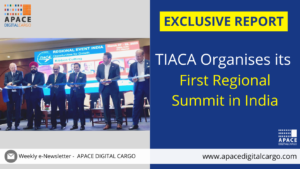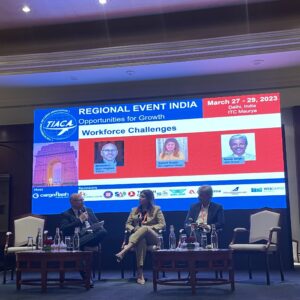
Apace Digital Cargo had the opportunity of attending as the media partner for The International Air Cargo Association (TIACA) Regional Summit – India, held from 27th to 29th March. Notably, this was their first regional event in India. The conference, which witnessed a huge participation from the Indian air cargo fraternity along with more than 50 speakers at the three-day event, featured insightful discussions on the transformation of the air cargo industry, regional challenges encountered by companies, and key digital innovations. The event was hosted by Cargo Flash InfoTech at the ITC Maurya in New Delhi and was organized by Glyn Hughes, Steven Polmans, Kenneth Gibson, and Rachael Negron.
The event started by the ribbon cutting ceremony which was done by Glyn Hughes, Steven Polmans, Sanjeev Gadhia, Yashpal Sharma, Sunil Arora and Jasraj Singh Chug
After the ribbon cutting ceremony, various discussion with the respective panel members began.
Roundtable Discussion Topic – Industry Leaders Roundtable
Speakers – Tushar Jani, Cyrus Katgara, Yashpal Sharma, Sanjeev Gadhia and Jasraj Singh Chug
During the discussion, the participants highlighted various ways in which COVID had forced them to adapt to new circumstances. Tushar Jani pointed out that COVID had underscored the critical importance of the pharmaceutical industry. Cyrus Katgara highlighted the shift towards digitalization, as COVID prompted companies to move away from paper-based processes. Yashpal Sharma noted the importance of adaptability in all aspects of work, while Sanjeev Gadhia spoke about the need to increase flights from Kenya to India in order to facilitate the transportation of COVID vaccines. Finally, Jasraj Singh Chug discussed how COVID had sparked innovation, leading to the creation of OCTOLOOP, a tool that helps connect airlines to forwarders and vice versa.
Roundtable Discussion Topic – Freighter Capacity: the Key for Growth
Speakers – Vipul Bhalla, Burak Omerogly and Brian Hermesmeyer
Burak Omerogly emphasized that Turkish Cargo aims to be one of the top 3 air cargo brands by 2028 and has identified potential growth areas in e-commerce and the pharmaceutical market. However, geopolitical risks, declining demand in Europe, and oversupply post-pandemic are among the risks the company faces. Brian Hermesmeyer highlighted the significant growth opportunities in India, including the massive untapped potential of the domestic market and the ASEAN and Middle East economic partnerships. Vipul Bhalla shared insights on Pradhaan Air Express, India’s youngest cargo airline that operates the world’s first and only A 320 Freighter, with a growing footprint and relief flight operations to ADA and other destinations.

Roundtable Discussion Topic – Workforce Challenges
Speakers – Sakshi Gupta and Sameer Shah
The panelists discussed the impact of the pandemic on their industry. Sakshi Gupta noted that technology played a crucial role in accessing corporate capabilities during the pandemic, while also highlighting the importance of their workforce as the organization’s biggest asset. Despite the challenges, they did not have to layoff any employees, and the digital transformation made their organization better.
Sameer Shah talked about how people fall in love with the industry but emphasized the need to build on what was learned during the pandemic and not revert to pre-pandemic practices. The discussion then moved on to attracting more people to the logistics industry.
Sakshi Gupta pointed out that logistics is a challenging yet rewarding industry, and there is a need to increase awareness of the industry. This can be done through introducing logistics-related courses, hiring more trainees and interns, and recognizing and rewarding existing employees. Sameer Shah noted that not hiring interns is a significant drawback and that it is an excellent idea to do so, with the government also promoting this initiative.
Roundtable Discussion Topic – Digital Innovation
Speakers – Gautam Mandal, Sabari Ramnath, Ashish Agarwal, and Suneet Gupta
Ashish Agarwal highlighted that technology has revolutionized the B2B experience, making it more like the B2C experience. Sabari Ramnath and Suneet Gupta emphasized the importance of collaboration in digital innovation. They argued that businesses need to work together to harness the power of technology. Gautam Mandal shared his perspective on the importance of a digital-first approach. He noted that businesses cannot rely on paper in the age of technology and must adopt digital-first strategies.
In conclusion, the speakers agreed that collaboration is essential for digital innovation. They emphasized the need for businesses to have a digital mindset and work together to implement digital strategies. The round table discussion highlighted the impact of technology on businesses and the importance of embracing digital innovation.
Discussion Topic – Border Management
Speaker – Job John
He highlighted several key factors that make the logistics industry efficient and effective for businesses. According to him, these factors include delivering the right item, at the right time, at the right place, in the right condition, in the right quantity, to the right customer, and at the right price.
He also talked about the Logistics Performance Index (LPI), an annual survey conducted by the World Bank that measures the efficiency of customs clearance processes, quality of trade and transport-related infrastructure, ease of arranging shipments, and other related factors. John emphasized the importance of LPI, citing its impact on economic growth, trade facilitation, supply chain management, and international benchmarking. He also discussed the six dimensions of LPI, which include customs, infrastructure, ease of arranging shipments, quality of logistics services, tracking and tracing, and timelessness.
Additionally, he highlighted the National Logistics Policy, which aims to create a trusted, robust, cost-effective, technologically enabled, and integrated logistics ecosystem in the nation for rapid and equitable growth.
Roundtable Discussion Topic – Airports : Conducting the Orchestra
Speakers – Zaheer Bakshi, Chandrakala Bobba, and Tushar Jani
Chandrakala Bobba expressed her pride in bringing cargo to the forefront of the conversation. Zaheer Bakshi stated that his job revolves around strategic decision-making, and their aim is to bring cargo business onboard. They plan to create transshipment business at the Delhi Airport, with RFC, or “Ready for Carriage,” making the entire cargo process easy. Tushar Jani mentioned that freight is part of his DNA, coming from a family in the industry for a long time.
The speakers agreed that the government plays a vital role in meeting the vision for the cargo industry at the Delhi Airport. They also discussed enhancing collaboration in the cargo industry, with Chandrakala Bobba focusing on the seamless nature of collaboration. Tushar Jani mentioned the monopoly situation in which all stakeholders were not mature enough and the need for the government’s support to act as a teacher in the scenario. Finally, Zaheer Bakshi discussed the importance of reducing the cost of freight.
Roundtable Discussion Topic – General Sales Agents and Service Agents (GSSA)
Speakers – Abhishek Goyal, Kritika Chaudhary and Prithviraj Chug
They discussed how the current GSSA system is a traditional model and emphasized the need to provide clients with one-stop solutions that incorporate digitalization, which is the future of the industry. The moderator, Glyn Hughes, asked the speakers what the “service” in GSSA meant to them and what additional services they provide to their clients. Kritika Chaudhary highlighted that for her, the extra “S” in GSSA represents a solution that her company provides to add value for clients. Prithviraj Chug suggested adding another “S” to GSSA, which would represent “security,” as all clients desire general and financial security. The speakers agreed that the industry faces significant gaps, which can be addressed with digital technology.
Roundtable Discussion Topic – Perishable Cargo : New Growth
Speakers – Kamesh Peri, Mark Sutch, Raveen Pinto and Keku Bomi Gazder
During the discussion, Kamesh Peri highlighted the large gap between the production and export of perishable goods in India. He stated that India produces almost 100 MT of fruits and 200 MT of vegetables, but only 4.2 MT are exported. Similarly, he shared that Delhi accounts for only 7% of air cargo perishables exported from India. Mark Sutch emphasized the importance of collaboration with exporters to ensure success in the industry. Keku Bomi Gazder raised the question of whether enough is being done to promote agriculture in India, given that over 50% of the country’s workforce is employed in this sector.
The discussion also touched on some of the gaps that currently exist in the industry. Kamesh Peri highlighted the gap between what needs to be produced and what needs to be stored, as well as the gap between the right sort of transportation capacity and packaging capacity. Reji John also discussed the importance of the three Rs – REUSE, REDUCE, and RECYCLE – when it comes to packaging solutions for perishable goods. Overall, the discussion shed light on some of the challenges and opportunities in the industry, highlighting the need for collaboration and innovation to drive growth.












